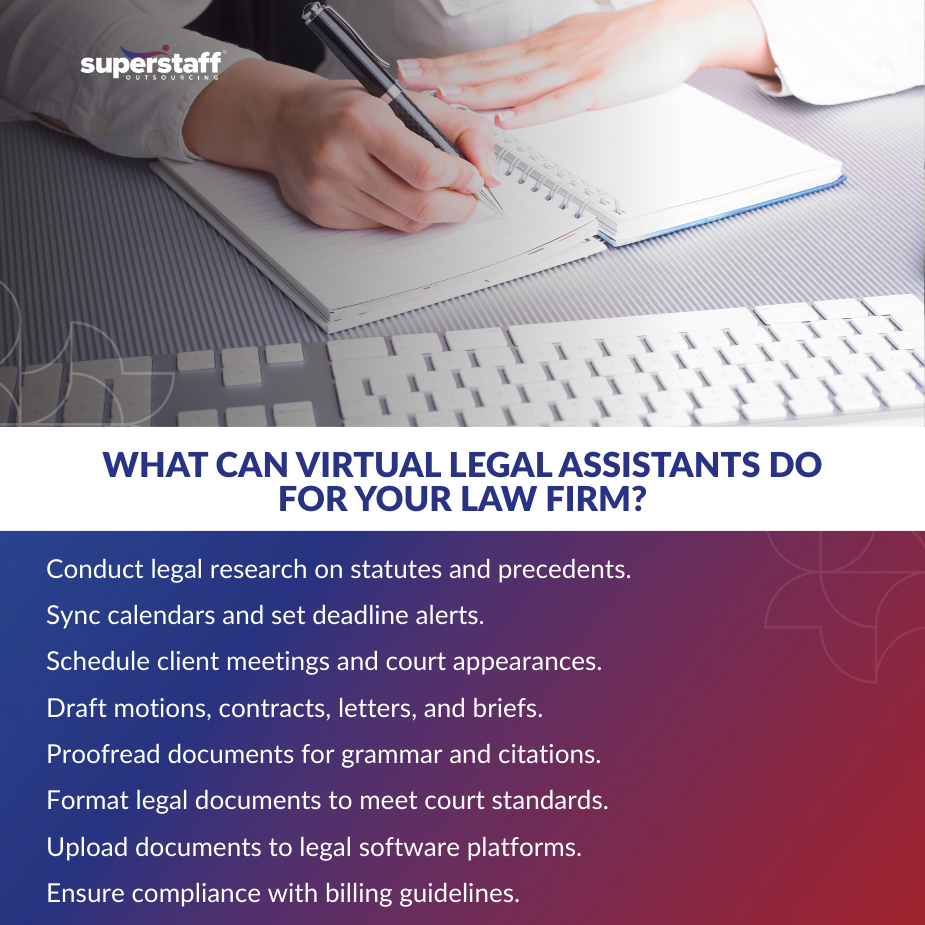
Juggling client communications, legal research, filings, and calendar management can leave even the most seasoned legal professionals overwhelmed. With mounting caseloads and limited administrative bandwidth, many attorneys find themselves spending more time on operations than on actual legal strategy or client advocacy. Fortunately, the rise of virtual legal assistants is changing that equation.
These remote professionals are redefining how law firms operate—taking on essential yet time-consuming tasks so legal teams can focus on higher-value work. From preparing case documents and managing dockets to handling client intake and billing support, virtual legal assistants offer a seamless extension of your in-house team without compromising confidentiality or precision.
In this blog, we’ll explore the core responsibilities that virtual legal assistants can handle and highlight how outsourcing these services enables firms to run leaner, scale faster, and deliver better client outcomes. Whether you’re a solo practitioner or managing a mid-sized firm, understanding the power of virtual support could be your next strategic move.
1. Case Preparation and Legal Research
Case prep and research are foundational but labor-intensive tasks—ones that VLAs can execute with precision.
Virtual legal assistants help attorneys organize facts, review documents, and summarize findings so that legal teams are better prepared for proceedings. They handle:
- Drafting case outlines and discovery logs
- Conducting statute and precedent research
- Summarizing depositions and evidence
By having a VLA manage this workload, attorneys save hours without sacrificing quality or compliance.
Once the case groundwork is done, daily operational support becomes just as essential.
2. Calendar and Docket Management
Keeping track of court dates, client meetings, and filing deadlines is critical to legal success.
Virtual legal support professionals can manage multiple attorney schedules, preventing costly errors and missed appearances. They assist by:
- Calendar syncing and alerts for deadlines
- Managing appointments with clients and courts
- Updating case timelines in legal software
VLAs ensure that your practice runs like clockwork—no matter how complex your caseload.
Beyond scheduling, communication with clients is another area where virtual assistants shine.
3. Client Communication and Intake Support
First impressions matter, and VLAs often serve as the initial point of contact.
Virtual legal assistants can handle client intake, schedule consultations, and respond to follow-ups professionally, helping firms maintain responsiveness and professionalism. Responsibilities include:
- Conducting client pre-screening interviews
- Answering frequently asked questions
- Updating clients on routine case statuses
Whether it’s a new lead or a long-term client, virtual assistants keep communication smooth and consistent.
Supporting attorneys also involves managing internal legal documents with accuracy and speed.

4. Document Drafting and Proofreading
Beyond handling client communication, virtual paralegal services may also involve creating polished legal documents, freeing attorneys for high-value tasks.
While the final review always rests with the attorney, virtual legal assistants can prepare:
- Motions, contracts, letters, and briefs
- Proofread documents for grammar and citation errors
- Format materials in accordance with court rules
This blend of technical know-how and attention to detail ensures every document meets professional and legal standards.
Just as crucial is ensuring all these documents are organized and accessible when needed.
5. File Management and E-Discovery Support
Proper organization of digital files is essential for legal compliance and efficiency.
Virtual legal assistants play a key role in managing the ever-growing volume of legal documents and evidence. Their tasks include:
- Indexing and tagging case files
- Uploading documents to practice management software
- Supporting the e-discovery process by flagging relevant records
In complex cases, a well-managed digital repository is a game-changer.
Aside from legal work, virtual assistants also take on administrative and billing support tasks.
6. Billing, Timesheet, and Expense Tracking
Accurate billing is the lifeblood of any legal practice—and VLAs can keep the numbers in check. Ensuring reliable billing, timesheet, and expense tracking is among the most crucial benefits of outsourcing legal admin tasks.
These key functions require precision, discretion, and consistency, all of which virtual legal assistants deliver. They help by:
- Tracking billable hours and expenses
- Drafting invoices and managing billing cycles
- Ensuring compliance with client billing guidelines
With VLAs maintaining financial accuracy, attorneys can focus on client advocacy and case outcomes.
With these critical services handled, attorneys can focus more on strategic growth.
The Business Impact of Outsourcing Virtual Legal Assistants
Outsourcing virtual legal assistants isn’t just about reducing workload—it’s about unlocking greater operational value, cost flexibility, and long-term strategic growth. While law firms traditionally relied on full-time, in-house administrative staff, that model comes with high overhead costs and limited scalability. In contrast, partnering with outsourced VLAs provides a more agile and cost-effective solution that adapts to the evolving needs of modern legal practices.
Reduced Overhead Compared to In-House Hires
Bringing on full-time legal assistants means covering salaries, benefits, training, office space, equipment, and other fixed expenses. These costs quickly add up—especially for small or mid-sized firms operating on tighter budgets. Outsourced virtual legal assistants eliminate much of that financial burden. You only pay for the services you need, when you need them, without the added expense of full-time employment obligations. This leaner cost structure allows firms to redirect resources toward revenue-generating legal work and client development.
24/7 Productivity Across Time Zones
Virtual legal assistants based in different geographic regions can keep your practice running even after your local team clocks out. Need discovery files organized overnight? Or client follow-ups completed before your morning brief? With support staff in different time zones, your firm can operate around the clock—ensuring no delays in administrative workflows, research, or client communication. This is especially valuable in litigation or high-volume practices where responsiveness and turnaround time are critical.
Easier Scale-Up During High-Volume Seasons
Litigation surges, year-end closings, regulatory deadlines, or sudden influxes of client demand often require more hands on deck. Hiring and onboarding additional in-house staff can be too slow and expensive to respond effectively. Outsourced VLAs offer the ability to scale up your team on demand, whether temporarily or long-term. You can add resources during peak seasons and scale back when caseloads ease—maintaining operational balance without compromising service quality or exhausting your in-house team.
By outsourcing to skilled virtual legal assistants, law firms gain access to a global talent pool of experienced professionals—many of whom are trained in legal research, documentation, and compliance workflows specific to U.S. or international legal systems. These remote professionals are not just assistants—they are productivity partners who enhance your ability to serve clients efficiently and effectively.
The benefits are clear—but how do you get started? Choosing the right outsourcing partner is the next crucial step in building a more agile, client-focused legal operation.
Choosing the Right Outsourcing Partner for Legal Support
Not all outsourcing partners are equal—legal firms need those with industry-specific experience.
A good outsourcing provider understands legal confidentiality and operational nuance. When selecting a provider, look for:
- Experience in legal process outsourcing (LPO)
- Data privacy protocols and compliance certifications
- Dedicated and trained virtual legal staff
The right partner will act as a true extension of your team, not just a back-office vendor.
Wrapping up, let’s revisit why a virtual legal assistant could be your smartest hire this year.
Improve Law Firm Efficiency By Hiring Virtual Legal Assistants From SuperStaff
Virtual legal assistants handle far more than admin—they’re strategic partners in law firm efficiency.
From case prep and client intake to document management and billing, VLAs provide end-to-end support that frees attorneys to focus on practicing law, not running a business.
Ready to streamline your firm’s operations? Discover how SuperStaff’s trained virtual legal assistants can help you reclaim time, reduce costs, and serve your clients better.






